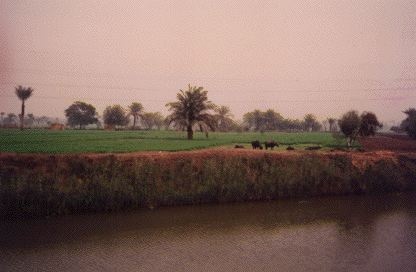Nature,
Forests &
Rivers:
the creation of myths about
wooded and watered landscape and the historic reality of deforestation.
Revolutionary
ideas
| America | A decisive Question
| Ancient ideas | Gardens | Water
"On the eve of the Revolution [1789], and from
apparently the opposite corners, the French and British forestry states were
in fact converging. For although the monarchy seemed to be in control of France,
and the land owning class in England, the battles being fought on both sides
of the Channel for the posterity of the their forests were virtually identical.
In the oak woods of Sussex to the forests of the Morvan and the Vosges, a triangular
(and unequal) contest for precious timber was underway. At one corner were those
-- merchants, contractors, stewards, tenant farmers -- who had shrewdly bought
up a piece of woodland and who looked on the trees as so much standing capital,
to be realized or reinvested as the market dictated. At the other corner were
the landless poor whose survival depended on the defense, violent if necessary,
of traditional rights to gleaning, gathering, and cropping. And at the apex
of the triangle were the officials of the state, increasingly desperate about
the shortage of ship timber and suffering from nightmares of the last pine and
the last oak snatched by the "Other Side."
Revolution
These were the realities of the timber
empires. But the French Revolution was less concerned with realities than with
justice and retribution.... In the forests there was a general and joyous slaughter
of game while herds of cows and flocks of pigs turned the preciously guarded
reserves into a green feeding trough. And now that the Revolution had abolished
the right of woodland owners to kill any goats, their numbers phenomenally multiplied,
advancing on the woods, nibbling and grinding their way through the saplings.
And while liberty trees --a political adaptation
(via America) of the traditional Maypole symbols of fertility and rebirth
-- were going up all over France, Colbert’s precious grande futaie was coming
down. Liberated from the custody of their masters and grand masters of the
Eaux et Foréts, the forests were virtually open to all comers; and
facing winters at the end of the eighteenth century that were as brutal as
those at the beginning, the poor of the French woodlands helped themselves.
‘They take wood as though it were cabbages in their garden,’ complained one
local official. But the winters of the Revolution were the winters of the
wolf. Humanity and prudence dictated a blind eye. Great holes appeared in
the dense forests where desperate gangs with axes and mattocks had hauled
away everything they could, green or dry. What use was freedom, what use was
bread, to the frozen?"
§§§
Revolutionary
ideas | America | A decisive Question | Ancient ideas | Gardens | Water
American Landscape
American modernity,
even in its most aggressively imperial forms, then, has been no more depleted
of nature myth and memory than any other culture. Only blind obedience to
the assumptions of the Enlightenment claims science and capitalism to be necessarily
incompatible with natural religion. Two centuries of American culture in which
both have flourished in a constant state of dynamic hostility --...-- proves
such assumptions are unfounded.... at the beginning of this century the anthropologists
busy codifying the ritual practices and symbols of "primitive" religion were
profoundly divided on the issue...: the persistence of myth. On the threshold
of the age of science, it was left to art historians and psychologists to
take seriously the possibility that myth and magic might obstinately make
themselves felt, encoded in symbolic forms, in a world where, as Rudolf Wittkower
has put it, ‘our lives are fenced in by rituals sunk to the level of conventions.’
But a more dominant and conventional view was the opposite: that the vitality
and authority of nature religions declined precisely to the degree that cultures
were shaped by scientific, empirically derived knowledge. And none believed
this truism inherited from the Enlightenment, more categorically, even while
he was laboring in the forests of myth and magic, than the anthropologist
Sir James Frazer. "
Revolutionary
ideas
| America | A decisive
Question | Ancient ideas | Gardens
| Water
"In 1723 Marseilles had been the center of the
last great outbreak of bubonic plague in Europe."
Joel Barlow asked from the Marseilles’ pesthouse in August
of 1797
How was the world governed? By Machinery or by magic?
"Everything flowed toward one great
riddle: the operation of nature and how man had apprehended it." he had read:
Pierre Perrault
"Following a hypothesis first set out in antiquity, Perrault
had argued that rivers were simply the product of evaporated sea water condensed
into rain and collected between the porous surface of the earth and the impervious
strata of bedrock. Super saturation produced springs from these aquifers,
which then descended from the hills and mountains toward the sea."
"Plato had believed the circle to be the perfect form, and
imagined that nature and our bodies were constructed according to the same
mysterious universal law of circulation that governed all forms of vitality."
"Barlow began to take myth more seriously as a complicated
order of belief."
Charles Francois Dupuis, The Origins of all Faiths
or, the Universal Religion
inventor of the telegraph
sought to understand the anthropological origins of religion
win terms of human apprehension of the celestial bodies.
"Perhaps the universe was neither a lump of indifferent matter
that the materialists saw when they looked at the stars nor the dumb toy of
the Almighty, made in his image and manipulated according to his will, as
the Christians insisted. Perhaps divinity was Nature -- its spirit self embodied
in natural forms like the greenery of the world and its running water?"
All religions ... had been (at their essence) natural
religions."
Suppose, then, that the true fraternity of men lay not in some
rationally articulated political formula requiring universal assent, but in
an immense and and venerable stock of responses to nature that had been culturally
encoded as myth. Suppose also that a diligent investigator could uncover the
connections between such myths across cultures and centuries....Was it conceivable,
after all, that the world was both machinery and magic?"
"on one matter he was categorical. The Liberty Tree, in its
remote origins, was the amputated penis of Osiris."
Barlow began "with the assumption that the dying of the sun
in the autumn, ‘causing the vegetation to cease,’ had given rise to the ancient
‘fable’ of Osiris."
the myth of Adonis, Atys, Osiris -- where "death and resurrection
are symbolically linked to the calendar of nature." "And there is no dispute
that the most prominent feature of Dionysian festivals was the display of
an imposing ritual phallus."
§§§
Revolutionary
ideas
| America | A decisive
Question | Ancient ideas | Gardens
| Water
Nile cult of fecundity and
flood: What is its true meaning?
"Rituals were elaborated that associated Osiris-Serapis
with the inundations of the fertile river, and the associations were strong
enough for Seneca in the first century A.D., to attach significance to the fact
that it was from the island of Philae, close to the two crags known as the ‘veins
of the Nile,’ that the annual rise was first observed."
"the taboo on consuming bream was especially strict since,
according to the Greek chronicler, it was the herald of resurrection, appearing
in the Nile in late June as a ‘self-sent messenger... announcing to a happy
people, the rise of the river."
"Following a famous passage in Plato’s Timaeus, Plutarch claims
that the workings of the natural universe were so marvelously self-contained
and interlocking that they must necessarily be the visible embodiment of divinely
originating principles of perfection."
"it was ... peculiar that its seasonal inundation also reversed
conventional expectations, being at its height in the parching summer, when
all other known rivers were at their low point.
Revolutionary
ideas | America | A decisive Question | Ancient ideas | Gardens | Water
Egyptian Book of
the Dead
"The Nile appeareth at thy utterance [Osiris],
making men live through the effluxes that come forth from thy members, making
all cultivated lands to be green by thy coming, great source of things which
bloom, sap of crops and herbs, lord of millions of years, sustainer of wild
animals, lord of cattle; the support of whatsoever is in the heavens is thine,
what is in the waters is thine."

Nile River at Cairo, Egypt.
"The connection between sacrifice, propitiation, and fluvial
abundance seems to have occurred in all the great river cultures of antiquity."
"in Plato’s dialogue, Critias describes the Nile as a ‘savior
river, rather than a destroyer, its waters gradually rising from below, unlike
the Greek torrents which crashed down from a mountainous height, threatening
cities like Athens with destruction. This consistency of behavior, Critias
continues, was the essential reason why the temples and monuments of Egypt
were better preserved than anywhere else; what made the Nile, in fact, the
river of longevity, of memory."
"Egypt’s fluvial myth, of the death and rebirth of waters,
promised above all, regularity. But insofar as archaeologists have been able
to reconstruct ancient hydraulic history, the Nile could behave with alarming
unpredictability, varying the amount of aluvium deposited on the banks of
the basin and the Delta by as much as 30 percent over the course of a century."
What the river could authorize it could also take away."
"For while Joel Barlow thought he had found the origins of
the cult of liberty in the myth of Osiris and Isis, a less eccentric view
has tied together the behavior of the Nile with the establishment of absolutism.
A long tradition of sociologists, from Karl Marx to Karl Wittfogel, have seen
‘hydraulic societies’ and despotism as functionally connected. In naturally
arid regions, they argued, only an absolutely obedient, virtually enslaved
regime could possibly have mobilized the concentrations of labor needed to
man and maintain the irrigation canals and dikes on which intensive agriculture
depended."
Revolutionary
ideas
| America | A decisive
Question | Ancient ideas | Gardens
| Water
§§§
The link between myth, observation, visions and
creations of the garden
"of one thing we can be sure. Fabri was no original.
In his caravan he brought a pack of myths and fables about the shape of the
world, ancient and modern, that at the end of the fifteenth century were commonplace.
In such visions there was no clear distinction between astronomy
and astrology, and both played their part in Fabri’s consideration of the
seasonal rise and fall of the Nile beneath the signs of Leo and Virgo. And
his apparently untroubled assimilation of pagan and sacred texts certainly
owed something to the popular anthologies of classical myth and lore exemplified
by Boccaccio's De genealogia deorum."
"...two essential features stood out.
"The first, ultimately derived from Plato, was
the fundamental unity of the world, both in tim and space.

Secondly, the fluvial literature of the fifteenth
and early sixteenth centuries became obsessed with mystifying the Source.
To return to primitive antiquity was, after all, to become bewitched with
myths of creation, and the ultimate origin was represented as a fountainhead.
A contemporary of Seneca. Philo Judaeus, commenting on the rivers of paradise,
had described a fons sapientiae: the mystically revealed union of goodness,
beauty, and wisdom, the closest thing that could be apprehended, even metaphysically,
to the secrets of creation. And from the early sixteenth century, this
gush of esoteric illumination was conceived, visualized, and eventually,
in the gardens and parks of Renaissance villas, actually designed as a
basin of moving water."
fons sapientiae "fountainhead of wisdom"
fount of reason, fountain of knowing, source of meaning.
§§§
Home | Site
Map | Place | Gallery
Guide | Worldview


